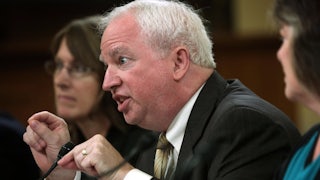Democrats in Congress now have a brief window to shepherd a bipartisan infrastructure bill to its completion, finalize the plans for a budget reconciliation bill filled with key Democratic Party priorities, and successfully raise the debt ceiling so that the economy doesn’t whirl into a downturn amid the Covid-19 pandemic. It’s quite a daunting obstacle course; you might even call it a high-wire act. More specifically, however, you can call this President Biden’s entire legislative agenda.
Once these three matters are settled, that’s basically a wrap for Democratic lawmakers for the next few years. Yes, the House of Representatives has taken action on a number of other measures, such as voting rights, and it might pass further bills down the line. These efforts will all run aground in the Senate, where too many Democrats prefer to maintain the filibuster than pass laws that might end up on Joe Biden’s desk.
Most of the coverage of the Democrats’ current travails has focused on how factionalism between moderates and progressives could prevent Biden’s legislative agenda from ever being enacted. But it might be a good thing to set these divisions aside and consider what unites all Democrats: the need to minimize the damage to their majorities in 2022 and to reelect Biden two years after that. That’s three solid years of relentless campaigning. What do Democrats plan to say to voters during this time? What accomplishments will they cite as a reason for voters to keep them in power?
When we last checked in with the Democrats tasked with coming up with their midterm messaging, they were extremely concerned about polling that indicated they would lose their majorities in the midterms. Fortunately, they had a plan: a “messaging blitz” to tell voters about all the good stuff in President Biden’s legislative agenda. “Everything we are doing and everything we’ve talked about doing is incredibly popular,” said Democratic Congressional Campaign Committee executive director Tim Perisco.
It sounds like a pretty good idea: Campaign on the popular stuff you’re passing? Sure, why not? The scheme hits a roadblock, however, if you don’t actually pull off the part where the popular stuff gets passed. And the trend since Perisco articulated his master plan has not been encouraging, as Democrats keep denying themselves the opportunity to actually enact the popular things that are central to their own reelection campaign messaging.
Some cases in point: As Grace Segers recently reported, the expansion of the child tax credit has proven to be an incredibly effective policy and a political slam dunk with massive public support. But there aren’t enough Democrats who support maintaining it, so it will probably expire. Last week, a plan to allow Medicare to negotiate with pharmaceutical companies for lower drug prices failed to advance out of the House Energy and Commerce Committee because three Democrats, who happen to take a lot of money from Big Pharma, blocked its passage. Polls indicate that the plan was wildly popular in those three members’ districts, but it didn’t matter. Worse, this drug pricing plan was essential to the budget, as it promised to offset some of the costs of a bill that must be deficit-neutral to pass through reconciliation.
It’s not unusual for Democrats to get squeamish as they near the goal line, as anyone who lived through the tortured final stages of the Affordable Care Act’s passage can recall. But as The Washington Post’s Dave Weigel observed on Twitter, Democrats returned from their August 2009 recess having endured a lot of public remonstrations against Obamacare. That’s not a factor now. “You aren’t seeing a real (as opposed to astroturf) backlash to reconciliation,” Weigel tweeted. “It’s … surprising to watch conservative Dems get squeamish in the same way without any visible public opposition. Nobody flooding their town halls, no anti-reconciliation protests,” he added.
Instead, that pressure seems to be coming from Democratic elites, such as the Center for American Progress’s John Podesta, who, The New York Times reports, sent a memo to “every office of a Democratic member of Congress” articulating his belief that Democrats will lose their majorities if they don’t “pare back a proposed $3.5 trillion social policy plan that carries much of President Biden’s domestic agenda.” What’s missing from Podesta’s urgings, however, is evidence to support his claim.
In lieu of a sturdy rationale that might clarify why Democrats might face the public’s wrath for passing a $3.5 trillion budget, Podesta has mixed messages galore. Once the budget is scaled back to some never-cited magic number, he says, moderates must support it. Not doing so will “signal a complete and utter failure of our democratic duty, and a reckless abdication of our responsibility,” he wrote in his memo. Podesta also insists that when it comes to “the climate crisis in particular.… There is no time. There is no next time”—an odd thing to append to an insistence that the only viable bill that specifically addresses climate change be pared back.
Podesta says that the failure to enact Biden’s agenda “would define our generation’s history and show that, when our time came, we failed, both for Americans now and in the years to come.” On that score, I’m inclined to agree. And yet every day, Democrats seem to stray further and further from the original plan to use their majorities to pass a lot of popular measures on which they can campaign. And if Podesta’s inscrutable hokum is any guide, it’s not clear that Democrats really know what they’re going to spend the next three years talking about if they fail to deliver. To borrow a phrase, perhaps Democrats should just pass the damn agenda.
This article first appeared in Power Mad, a weekly TNR newsletter authored by deputy editor Jason Linkins. Sign up here.






